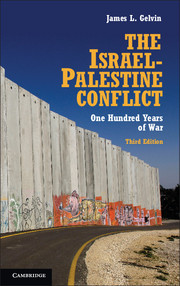Book contents
- Frontmatter
- Contents
- List of Illustrations and Maps
- Author's Note
- 1 The Land and Its Lure
- 2 Cultures of Nationalism
- 3 Zionism and the Colonization of Palestine
- 4 World War I and the Palestine Mandate
- 5 From Nationalism in Palestine to Palestinian Nationalism
- 6 From the Great Revolt through the 1948 War
- 7 Zionism and Palestinian Nationalism: A Closer Look
- 8 The Arab-Israeli Conflict
- 9 The Palestinian National Movement Comes of Age
- 10 Coming Full Circle: Oslo and Its Aftermath
- Glossary
- Time Line of Events
- Biographical Sketches
- Index
- References
8 - The Arab-Israeli Conflict
- Frontmatter
- Contents
- List of Illustrations and Maps
- Author's Note
- 1 The Land and Its Lure
- 2 Cultures of Nationalism
- 3 Zionism and the Colonization of Palestine
- 4 World War I and the Palestine Mandate
- 5 From Nationalism in Palestine to Palestinian Nationalism
- 6 From the Great Revolt through the 1948 War
- 7 Zionism and Palestinian Nationalism: A Closer Look
- 8 The Arab-Israeli Conflict
- 9 The Palestinian National Movement Comes of Age
- 10 Coming Full Circle: Oslo and Its Aftermath
- Glossary
- Time Line of Events
- Biographical Sketches
- Index
- References
Summary
The 1948 war between Zionists and Palestinians, then between Israel and Arab states, left two unresolved issues. First, although the State of Israel received the recognition of most other states in the world, the surrounding Arab states refused to grant it recognition. Representatives from those states balked at confirming Israeli sovereignty by sitting opposite their Israeli counterparts at state-to-state negotiations held to resolve the dispute. And to further isolate and increase the pressure on Israel, the Arab League imposed a diplomatic and economic boycott on the new state soon after the war. The second unresolved issue – which provided Arab states with the justification for their refusal to accord Israel recognition – was the problem of the Palestinian refugees.
Israel attained its independence during the great wave of decolonization that began after World War II. When the United Nations was founded in 1945, it included 51 states as members. By 1965, there were 118 members. But Israel differed from other states that achieved independence during this period in three ways. First, most other newly independent states had to adapt institutions imposed by a colonial power or create those institutions from scratch. Israel, on the other hand, entered its period of independence with a strong heritage of institutions built from the bottom up during the previous half century. Furthermore, whereas other newly independent states had to subjugate recalcitrant groups living within their borders or win them over to the nationalism of the ruling elites, Israel had reduced its most recalcitrant internal adversaries – the Palestinians – to a manageable minority, leaving the Jewish majority to debate the finer points of a commonly held nationalist ideology, Zionism. Although it is true that political debate in Israel has often resembled a bloodsport, the fractiousness that divided other emerging states was kept within limits.
- Type
- Chapter
- Information
- The Israel-Palestine ConflictOne Hundred Years of War, pp. 166 - 197Publisher: Cambridge University PressPrint publication year: 2014

